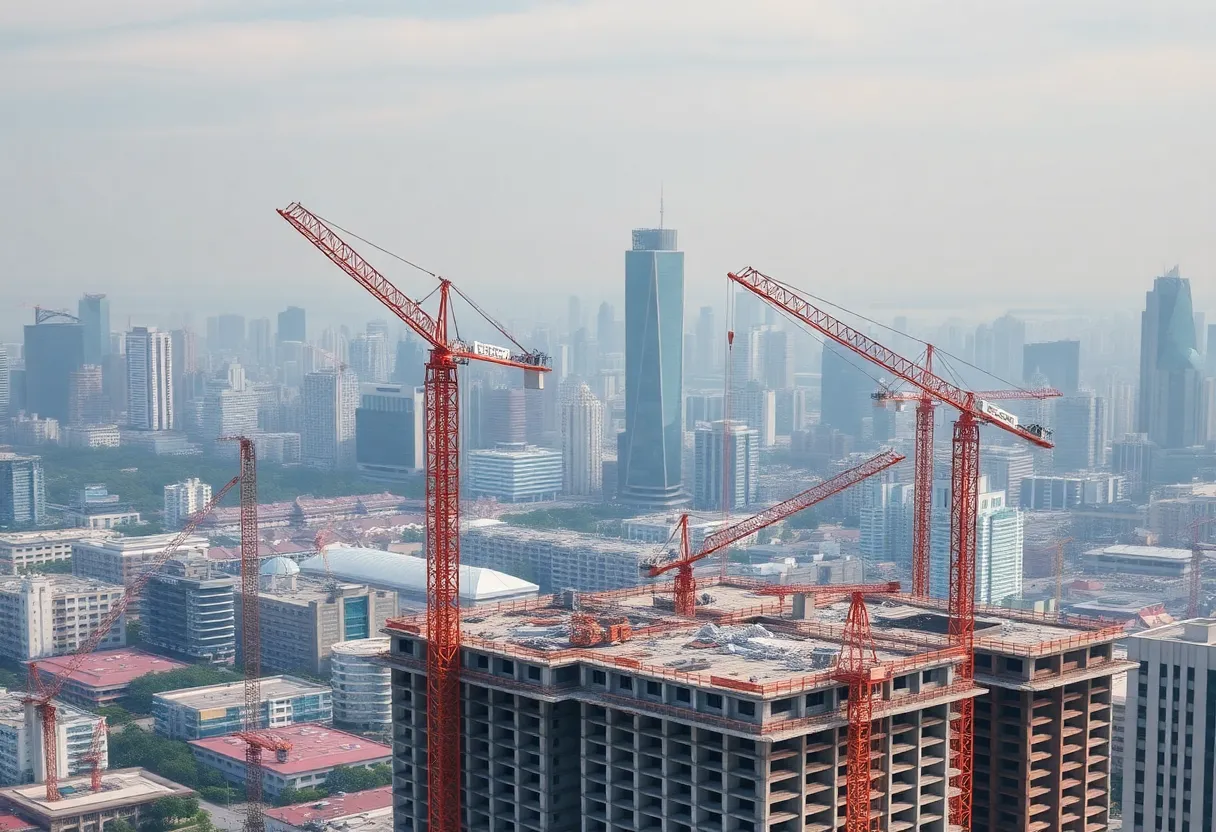News Summary
The U.S. hotel room construction has reached a 10-year low with only 5,000 rooms under development. Economic uncertainties, high costs, and labor shortages are among the key factors behind this decline. Developers are reportedly shifting some projects toward affordable housing, addressing pressing market needs. This slowdown is affecting tourism-dependent economies, particularly in major cities such as Miami and Las Vegas, which may see prolonged recovery challenges. Analysts predict a potential rebound post-2026 elections if economic conditions improve.
Nationwide: U.S. Hotel Room Construction Hits 10-Year Low Amid Economic Uncertainties
The volume of U.S. hotel rooms under construction has dropped to a 10-year low, according to recent data, signaling a slowdown in the hospitality sector. This decline reflects broader economic challenges that have halted many development projects across the country. With only 5,000 rooms actively in progress nationwide, the figures highlight a significant reduction in activity compared to previous years.
Key factors contributing to this downturn include economic uncertainties, which have led developers to pause or cancel plans. The lingering effects of pandemic recoveries have further exacerbated the issue, particularly in tourism-heavy areas like Miami and Las Vegas. Developers point to high costs and labor shortages as primary barriers, making it difficult to move forward with new builds. As a result, some projects are shifting focus toward affordable housing to adapt to the changing market.
This drop in construction activity is affecting tourism-dependent economies nationwide, potentially slowing recovery efforts in regions that rely on hotel developments for jobs and revenue. Despite these challenges, analysts predict a possible rebound after the 2026 elections, as improved economic conditions could encourage new investments. Meanwhile, real estate investment trusts (REITs) such as Hilton Capital are adjusting their portfolios to mitigate risks. Even with the overall decline, luxury brands continue to invest in urban centers, viewing these areas as prime for long-term growth.
Construction professionals attribute much of the slowdown to permitting delays rather than external factors like weather, emphasizing the need for streamlined regulatory processes. This nationwide trend underscores the interconnectedness of economic factors and industry decisions, with potential implications for the broader construction sector.
Background on the Decline
The data on U.S. hotel rooms under construction comes from recent analyses, which show a sharp contrast to pre-pandemic levels. Before the global health crisis, hotel developments were booming, but the disruptions caused by lockdowns and travel restrictions have led to a prolonged recovery period. Cities like Miami and Las Vegas, known for their vibrant tourism industries, have been hit hardest, with fewer projects breaking ground due to reduced visitor numbers and financial instability.
Developers nationwide are facing increased expenses for materials and labor, compounded by supply chain issues that originated during the pandemic. This has prompted some to repurpose hotel projects into affordable housing initiatives, addressing a different market need amid housing shortages. The impact extends beyond individual projects, affecting local economies that depend on construction jobs and the hospitality sector for economic vitality.
Analysts suggest that political and economic stability following the 2026 elections could spark a revival, as lower interest rates and increased consumer confidence might encourage new developments. REITs like Hilton Capital are proactively managing their assets by diversifying investments, while luxury brands maintain a focus on high-demand urban centers to capitalize on premium markets. Overall, the construction industry is adapting to these challenges, with professionals highlighting permitting delays as a key obstacle that could be addressed through policy changes.
This slowdown in hotel room construction is a nationwide issue, reflecting the sector’s vulnerability to economic shifts and external pressures. As the industry navigates these hurdles, stakeholders are monitoring indicators for signs of recovery, which could reshape the landscape of American hospitality in the coming years.
The pivot to affordable housing represents a strategic adaptation, as some developers see opportunities in residential markets that are less affected by travel downturns. This change could help alleviate housing pressures in various regions, though it means fewer opportunities for the hotel industry. The broader impact on tourism-dependent economies includes potential job losses and delayed infrastructure improvements, affecting everything from local businesses to community services. Looking ahead, the forecasted rebound post-2026 elections is based on historical patterns where post-election periods often bring renewed investment confidence. Companies like Hilton Capital are exemplifying this adaptability by reallocating resources to more stable sectors. Despite the dips, investments by luxury brands in urban centers suggest a belief in the enduring appeal of city-based tourism. Construction experts emphasize that addressing permitting delays could accelerate progress, potentially unlocking stalled projects and fostering growth.
In summary, the nationwide decline in hotel room construction to a 10-year low is a multifaceted issue tied to economic recovery, cost pressures, and operational challenges. This development serves as a barometer for the health of the U.S. economy, with implications for future growth in hospitality and related industries.
FAQ Section
Frequently Asked Questions
- What is the current volume of U.S. hotel rooms under construction?
- Only 5,000 rooms are active nationwide.
- What factors have slowed hotel room developments?
- Economic uncertainties slowed developments, with developers citing high costs and labor shortages.
- How has the decline affected specific cities?
- Pandemic recoveries lag, affecting cities like Miami and Las Vegas.
- What are developers doing in response to the slowdown?
- Some projects pivot to affordable housing.
- What is the impact on tourism-dependent economies?
- The drop impacts tourism-dependent economies.
- When might the construction sector rebound?
- Analysts foresee a rebound post-2026 elections.
- How are REITs responding to the situation?
- REITs like Hilton Capital adjust portfolios.
- Are there any ongoing investments despite the decline?
- Despite dips, luxury brands invest in urban centers.
- What do construction professionals blame for delays?
- Construction pros blame permitting delays more than weather.


